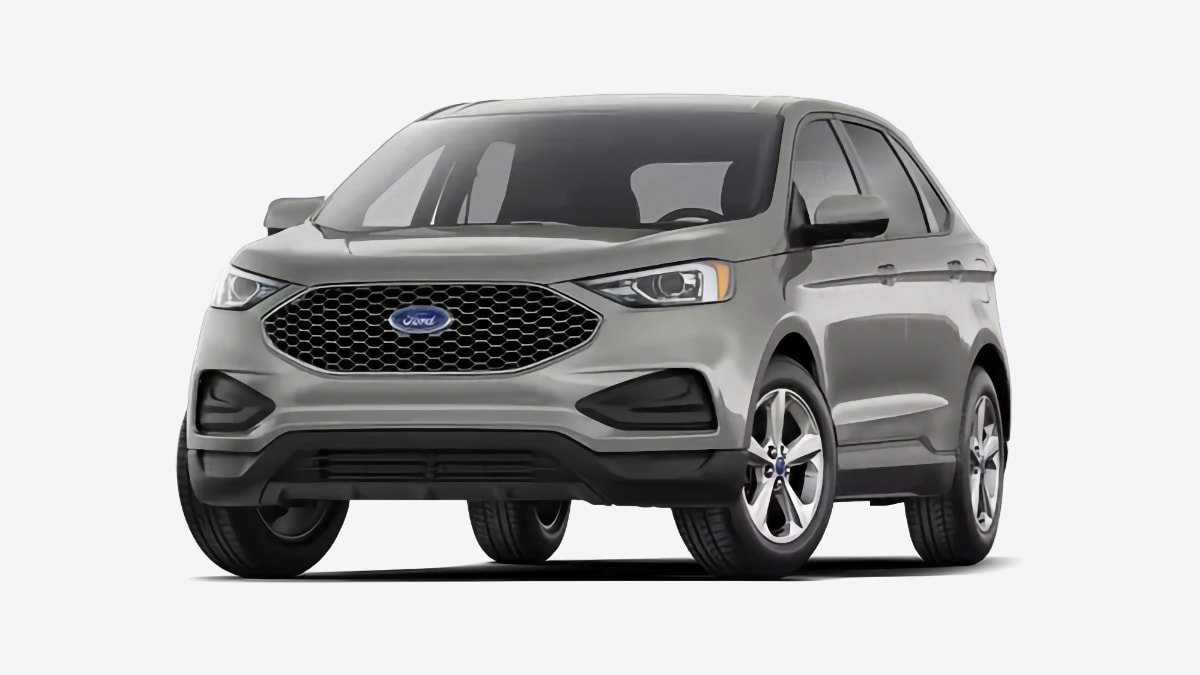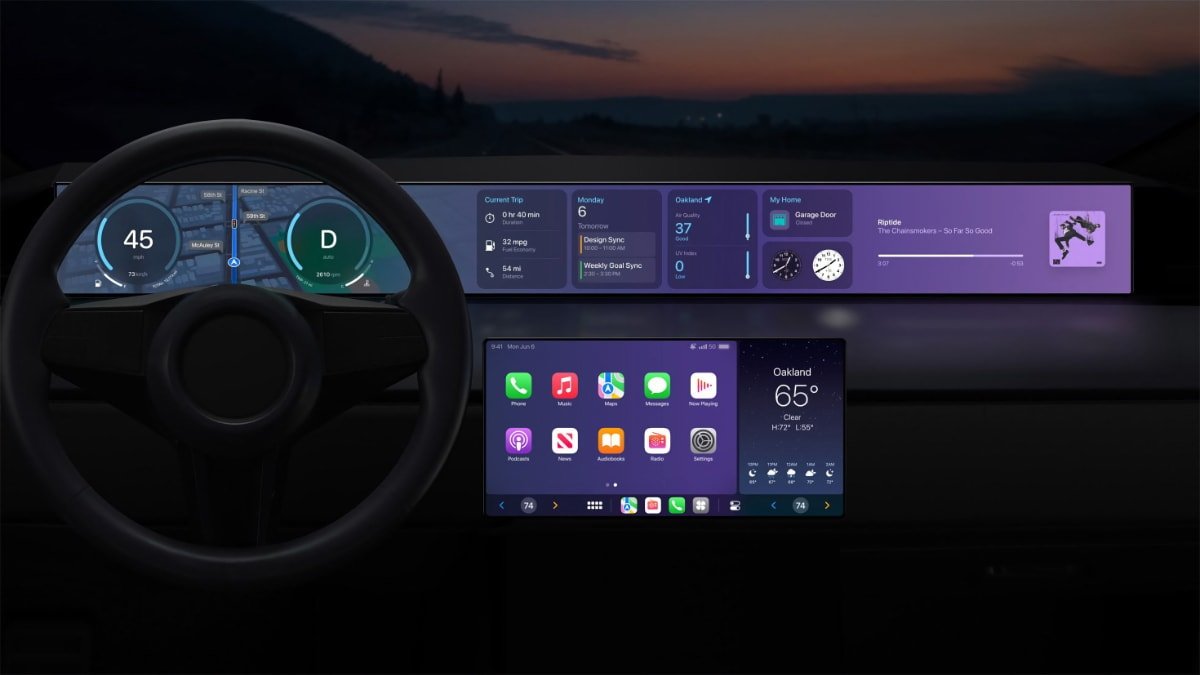Ford will stick with CarPlay as GM exits for Google tech
As General Motors plans to phase out CarPlay for its infotainment system, Ford won't so it doesn't risk losing Apple customers.

Ford will continue to stick with Apple's CarPlay
In an interview with Joanna Stern of The Wall Street Journal, Ford CEO Jim Farley spoke about the state of built-in infotainment systems in modern vehicles. He mentioned rivals Tesla and GM and how the companies' decisions affect customers.
Specifically, he believes that manufacturers aren't going to make much money on the content they provide through infotainment systems. Drivers instead will compare features like safety, security, driving autonomy, and productivity.
"In terms of content, we kind of lost that battle 10 years ago," Farley said. "So like get real with it, because you're not going to make a ton of money on content inside the vehicle."
"It's gonna be safety, security, partial autonomy, and productivity in our eyes, he continued. "So that relationship for content is between you, The Wall Street Journal, and the customer."
Farley's point is that since people already bring their smartphones into their vehicles, they won't want to pay for services they already have on their phones. Instead, they'll like to extend their smartphone into their car via CarPlay and Android Auto rather than having two separate systems.
On the business side, Farley doesn't believe having a custom infotainment system is enough of a differentiator to attract customers. He also mentioned that 70% of Ford customers in the US are Apple customers, so "Why would I go to an Apple customer and say good luck?"
In contrast, GM announced in March that it intends to gradually phase out CarPlay and Android Auto in its cars. Instead, it will build an internally-developed infotainment system in collaboration with Google, relying on subscription-based services.
It will keep CarPlay and Android Auto in its combustion vehicles, but future electric cars will use GM's system.

A preview of the next-generation of CarPlay
It hopes to profit from those subscriptions, such as Spotify, Audible, and other services. Drivers will also be able to use Google Maps and Google Assistant at no cost for eight years.
"We do believe there are subscription revenue opportunities for us," Edward Kummer, GM's chief digital officer, said. By 2030, GM CEO Mary Barra hopes to generate $20 to $25 billion in revenue from yearly subscription fees.
Apple intends to release what it calls the "next-generation" of CarPlay sometime in 2023, and will likely announce it at this year's WWDC. It will take over the car's instrument cluster to display gauges for stats like fuel and oil, engine temperature, and miles per gallon.
Read on AppleInsider

Ford will continue to stick with Apple's CarPlay
In an interview with Joanna Stern of The Wall Street Journal, Ford CEO Jim Farley spoke about the state of built-in infotainment systems in modern vehicles. He mentioned rivals Tesla and GM and how the companies' decisions affect customers.
Ford CEO @jimfarley98 says he's sticking with Apple CarPlay and Android Auto and his reason makes A LOT of sense https://t.co/0ZEvV5icyD
-- Joanna Stern (@JoannaStern)
Specifically, he believes that manufacturers aren't going to make much money on the content they provide through infotainment systems. Drivers instead will compare features like safety, security, driving autonomy, and productivity.
"In terms of content, we kind of lost that battle 10 years ago," Farley said. "So like get real with it, because you're not going to make a ton of money on content inside the vehicle."
"It's gonna be safety, security, partial autonomy, and productivity in our eyes, he continued. "So that relationship for content is between you, The Wall Street Journal, and the customer."
Farley's point is that since people already bring their smartphones into their vehicles, they won't want to pay for services they already have on their phones. Instead, they'll like to extend their smartphone into their car via CarPlay and Android Auto rather than having two separate systems.
On the business side, Farley doesn't believe having a custom infotainment system is enough of a differentiator to attract customers. He also mentioned that 70% of Ford customers in the US are Apple customers, so "Why would I go to an Apple customer and say good luck?"
In contrast, GM announced in March that it intends to gradually phase out CarPlay and Android Auto in its cars. Instead, it will build an internally-developed infotainment system in collaboration with Google, relying on subscription-based services.
It will keep CarPlay and Android Auto in its combustion vehicles, but future electric cars will use GM's system.

A preview of the next-generation of CarPlay
It hopes to profit from those subscriptions, such as Spotify, Audible, and other services. Drivers will also be able to use Google Maps and Google Assistant at no cost for eight years.
"We do believe there are subscription revenue opportunities for us," Edward Kummer, GM's chief digital officer, said. By 2030, GM CEO Mary Barra hopes to generate $20 to $25 billion in revenue from yearly subscription fees.
Apple intends to release what it calls the "next-generation" of CarPlay sometime in 2023, and will likely announce it at this year's WWDC. It will take over the car's instrument cluster to display gauges for stats like fuel and oil, engine temperature, and miles per gallon.
Read on AppleInsider

Comments
I'm one of those that will never buy a GM car because of this stupidity. At one time, I might have considered an EV from them, but not now. Thinking that they are going to make 20-25 billion from subscriptions from a car system is totally crazy. I would never pay one cent for a service that my iPhone already provides me while in the car.
Kind of a no-brainer really. Good luck GM.
Should be "It could take over…" if the vehicles manufacturer allows it.
As for GM, I can see them backing off this at some point. Enabling Android Auto and CarPlay in Android Automotive shouldn't be difficult.
Otherwise, I expect somebody to hack Android Automotive to enable those services.
The strange thing about GMs original announcement is that the services they discuss are free for 8 years so I don't see where that revenue stream is coming from unless it's for a data plan. Their current Essentials plan (no data for WiFi) is pretty sensible with OnStar, remote settings and vehicle monitoring including location tracking.
GM is trying to monetise their EVs by also becoming a middleman between the content owner and the driver. Clipping the ticket. If I was generous some MBA weenie convinced leadership to try to reduce the up front price of EVs as a barrier to entry by, in this case monetising the infotainment system through data mining. The next logical step would be to actually charge a subscription for these kinds of services, only possible if GM controls access. And after that of course, make the whole car a subscription.
the corporations will own everything in the end.
I wanted to buy a Tesla SO BAD last year... but I just couldn't do it due to the lack of CarPlay support... I spent more money to buy a car that supports the system I already use to track my entire life... so... I don't see how GM thinks they're gonna fare any better.
There's someone that understands their market. Not only are the content services well established, there's the whole continuity of experience between what you're listening to (or whatever) as you walk to/from the vehicle and what you have inside. "The same" is surely the best answer.
On a similar consistency argument, I am wary of the idea of CarPlay providing the vehicle-related displays. Quite apart from the safety angle (they mustn't just go away), the vehicle manufacturer is likely to produce the best match to the rest of the vehicle's ergonomics.
As it stands, from this article at at least, the word 'infotainment' is used which, as you point out, is a simple user facing content management system, not a deeply rooted car system.
Nothing to do with the vehicle-to-everything communications scenario nor the onboard mini-datacentre, nor the 'sensing' capabilities of the car, nor user facing control of items that are beyond infoainment.
GM is killing both the Bolt and CarPlay.
I guess we will be buying a ford next.